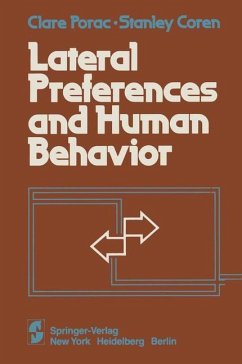Lateral preferences are strange, puzzling, and on the surface, not particularly adaptive aspects of behavior. Why one chooses habitually to write or to brush the teeth with the right hand, while a friend or family member habitually uses the left hand, might be interesting enough to elicit some conversation over dinner or a drink, but certainly does not seem to warrant serious scientific study. Yet when one looks at human behaviors more carefully, one becomes aware that asymmet rical behaviors favoring one side or the other are actually a fairly universal characteristic of human beings. In the same way that we are right or left handed, we are also right or left footed, eyed, and eared. As a species, we are quite lopsided in our behavioral coordinations; furthermore, the vast majority of us are right sided. Considering that we are looking at a sizable number of behaviors, and at a set of biases that seem to be systematic and show a predictable skew in the popUlation, the problem takes on greater significance. The most obvious form of lateral preference is, of course, handedness. When studying behavioral asymmetries, this is the issue with which most investigators start. Actually, we entered this research area through a much different route. Around 1971 we became interested in the problem of eye dominance or eye preference. This is a behavior where the input to one eye seems to be preferred over that to the other in certain binocular viewing situations.
Hinweis: Dieser Artikel kann nur an eine deutsche Lieferadresse ausgeliefert werden.
Hinweis: Dieser Artikel kann nur an eine deutsche Lieferadresse ausgeliefert werden.








